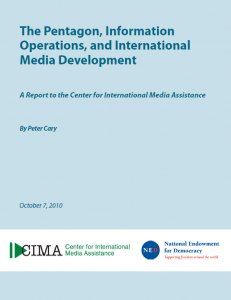** DOD SEES NO INTEL COMPROMISE FROM WIKILEAKS DOCS
** REVISITING THE DECISION TO GO TO WAR IN IRAQ
It is to be expected that national intelligence services will sometimes fail to identify and discover a threat to the nation in a timely fashion. But when intelligence warns of a threat that isn’t really there, and then nations go to war to meet the phantom threat — that is a serious, confounding and deeply disturbing problem.
But in a nutshell, that is the story of the war in Iraq, in which the U.S. and its allies attacked Saddam Hussein’s Iraq because of the supposedly imminent threat posed by Saddam’s stockpile of weapons of mass destruction — a threat that proved illusory.
A new book published in the United Kingdom called “Failing Intelligence” provides a remarkable account of the British experience of how intelligence on the Iraqi WMD program was shaped and packaged to support the decision to go to war in Iraq. The book’s author, Brian Jones, was the chief specialist in weapons of mass destruction on the UK Defence Intelligence Staff. He was also a skeptic of the stronger claims made about the existence of Iraqi WMD stockpiles. The book documents his mostly unsuccessful attempts to register that skepticism, to moderate the extreme claims made by government officials, and later to hold those officials accountable for their actions.
He provides a detailed first-hand account of how his efforts were consistently deflected in the rush to war, and how intelligence declined into propaganda. It’s a grim but instructive case study in the overlapping failure of intelligence gathering, intelligence production, and intelligence oversight.
The National Security Archive has recently published three richly informative collections of declassified U.S. and British government documents on the lead-up to the Iraq war (including several key documents cited or relied upon by Brian Jones).
“The more deeply the processes of creating the government reports on the alleged Iraqi threat are reconstructed — on both sides of the Atlantic — the more their products are revealed as explicitly aimed at building a basis for war,” wrote John Prados of the National Security Archive and journalist Christopher Ames in an analysis of the documents.
“In the light of a decision process in which no serious consideration was given to any course other than war, the question of whether American and British leaders set out to wage aggressive war has to be squarely faced,” they wrote.
See Also:
Review: Weapons of Mass Deception–The Uses of Propaganda in Bush’s War on Iraq
Review: Web of Deceit: The History of Western Complicity in Iraq, from Churchill to Kennedy to George W. Bush
Review: VICE–Dick Cheney and the Hijacking of the American Presidency
Review: Empire of Illusion: The End of Literacy and the Triumph of Spectacle
Review: Shooting the Truth–The Rise of American Political Documentaries
Review: Grand Theft Pentagon–Tales of Corruption and Profiteering in the War on Terror





